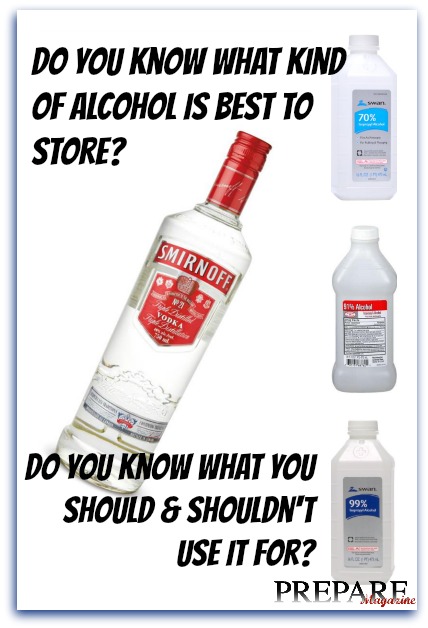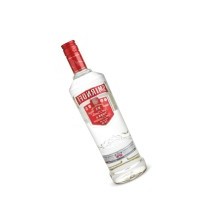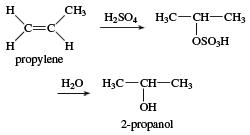“What is the Best Alcohol to Store for Emergencies?” This question is surprisingly not asked often enough. We see many options and percentages on the sales shelves near the bandages but do you really know what is best to purchase and keep on hand for your home emergency kit?
Selecting the type(s) alcohol is  only one part of the process. Knowing what you intend to use it for helps you to make the selection.
only one part of the process. Knowing what you intend to use it for helps you to make the selection.
We hope to address a few of the things that are rarely thought of when you’re told to have alcohol on hand for an emergency. With the variety to choose from and what each percentage can mean for potency. The more you know, the better you can make an educated choice for your storage and preparation plans.
There are two differing types of Alcohol: Isopropyl & Ethyl
In reference to health care, “alcohol” refers to two water-soluble chemical compounds—ethyl alcohol and isopropyl alcohol—that each have generally underrated germicidal characteristics.
Isopropyl alcohol is one of the most common members of the alcohol family of organic compounds. Isopropyl alcohol was the first commercial synthetic alcohol. It is easily synthesized from the reaction of propylene with sulfuric acid, followed by hydrolysis.
In some cases the hydration of propylene is carried out in one step, using water and a catalyst at high pressure. Isopropyl alcohol is mixed with water for use as a rubbing-alcohol antiseptic.
Isopropyl Alcohol is also called: 2-Propanol; Dimethylcarbinol and Rubbing Alcohol
[wpgfxm_contentbox width=”90%” bg_color=”#FAB900″ b_color=”#050C42″ style=”double” top=”2px” right=”none” bottom=”2px” left=”none” radius=”0px”]You’re Just a Click Away from a FREE Digital Subscription to PREPARE Magazine[/wpgfxm_contentbox]
Ethyl Alcohol is an important industrial chemical; it is used as a solvent, in the synthesis of other organic chemicals, and as an additive to automotive gasoline (forming a mixture known as a gasohol). Ethyl alcohol is also the intoxicating ingredient of many alcoholic beverages such as beer, wine, and distilled spirits.
Ethyl alcohol, also called ethanol, grain alcohol, or simply alcohol.
Both Ethyl & Isopropyl alcohol are effective but not equally.
Isopropyl Alcohol is effective in as little as 10 seconds. It kills bacteria, viruses, fungus, and tubercles on contact. But depending upon potency must come in contact with these contaminants for at least 10 seconds.
Isopropyl Alcohol is often already diluted in a variety of percentages before being sold. Isopropyl is most commonly sold in 70%, 91% and 99% solutions.
Ethyl Alcohol has the percentage is shown by the ‘proof’ on most grain and distilled spirits.
It can be used straight on a topical area or surface but is significantly weaker than Isopropyl Alcohol. If relegated to using a high proof Ethyl Alcohol such as Vodka for sterilization purposes, carefully check the percentage before diluting – especially since Ethyl Alcohol is already less effective against some contaminants than Isopropyl.
Effectiveness for each alcohol drops significantly when concentration is below 50%. So when searching the bottles at the drugstore for puchase or diluting for use – be careful to keep the percentages as high as possible for maximum potency.
Neither Ethyl nor Isopropyl alcohol are capable of killing spores, therefore cannot be used in “high level sterilization.”
[wpgfxm_contentbox width=”90%” bg_color=”#FAB900″ b_color=”#050C42″ style=”double” top=”2px” right=”none” bottom=”2px” left=”none” radius=”0px”]MORE Preparedness Tips in a FREE Digital Subscription to PREPARE Magazine[/wpgfxm_contentbox]
There are Disadvantages & Advantages of both types of alcohol.
The main disadvantage to storing alcohol is that both Ethyl and Isopropyl Alcohol are highly flammable. However, under certain circumstances this may actually be an advantage for fire starting.
Another mix of both advantage and disadvantage is that they can cause damage to rubber (hardening) and destruction of glues. This can work either for or against you, depending upon how it is needed. Either way, being aware is important.
An outright Advantage is that each of these are among the longest shelf-stable disinfectants known. And perfect for long term storage options. With very little breakdown or decomposition, alcohol lasts for a very long time for future use.
Another advantage, unique to the Ethyl Alcohol, is that it can be used to make tinctures and extracts for medicinal herbs. And lastly the advantage of storing Ethyl Alcohol is the opportunity to barter it and offer it up for another person’s consumption or addiction.
[wpgfxm_contentbox width=”90%” bg_color=”#FAB900″ b_color=”#050C42″ style=”double” top=”2px” right=”none” bottom=”2px” left=”none” radius=”0px”]HURRY – Get a FREE Digital Subscription to PREPARE Magazine & Get Prepared![/wpgfxm_contentbox]
Was this helpful information? Do you have more to share?
Please leave a comment!










Grain alcohol is good for barter and has a high alcohol content for killing bacteria and starting fires.It can also be used for some generators and can be watered now for drinking.
70% alcohol is the most effective at killing bacteria. 50% is not quite enough, but 90% actually evaporates a little too quickly to permeate the cell wall.
Thanks for the article!